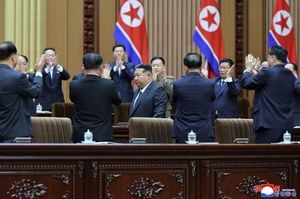In a bold move to boost its defense industry financing, the French government has introduced the "Bpifrance Défense" fund, a new capital investment initiative aimed at encouraging citizen investment in defense companies. During a televised interview on March 20, 2025, France's Minister of Economy Éric Lombard confidently declared, “Many French people will want to subscribe to defense products.” While the minister's sentiment indicates optimism, public opinion appears to be more divided as polls indicate a nearly even split: 45% of investors favor the initiative while 45% oppose it, presenting a mixed reception to the government's appeal for financial support.
As the need to bolster the defense sector becomes increasingly apparent—with the armament industry in France reportedly requiring 5 billion euros—Lombard's call to action presents a collective choice for citizens to support their country's security. The capital investment fund seeks to gather a target of 450 million euros and allows individual investors to participate directly in the capital of small and medium-sized enterprises (SMEs) and intermediate-sized enterprises (ETIs) operating within the defense and cybersecurity sectors.
The fund's framework is designed to provide a platform for everyday investors to support companies such as Thales, Safran, Airbus, and Dassault Aviation without directly purchasing shares in these larger, publicly traded entities. “You will be able to indirectly become a shareholder of defense sector companies,” Lombard explained. This initiative also addresses the growing performance of European defense stocks, which have seen significant gains, emphasizing stocks like Leonardo, Saab, and Rheinmetall since the beginning of the year.
Moreover, the initiative utilizes existing savings avenues such as the Plan d'Épargne en Actions (PEA), through which subscribers can buy shares in these companies. Thales, in particular, is noteworthy as it redistributes approximately 40% of its net profits back to shareholders, making it an attractive investment for private individuals.
The Bpifrance Défense fund will be accessible to all individuals, requiring a minimum investment of 500 euros, with potential as high as several thousand euros as a ceiling. The investment, however, is not akin to a savings account: funds deposited will be locked for a maximum of seven years. This means investors should be prepared to commit their resources for the long term, reflecting the nature of this financial product.
While the potential gains are appealing, ranging from 10% to 15% annually, the risks associated with such investments also require careful consideration. Nicolas Dufourcq, the director general of Bpifrance, emphasized this danger, noting, “When investing in equities, you can lose everything. It’s not a government-insured savings account.” Any yields are subject to management fees and taxes, and investors must maintain a level of patience and acceptance of risk for the chance to see returns.
This dual approach not only fosters direct investment in burgeoning defense firms but also integrates the potential for returns with the patriotic duty many French citizens feel amid rising tensions in Europe. Given the backdrop of increasing armed conflict on the continent, the financial commitment from French citizens signifies both an opportunity to invest and a duty to support national security.
Commentators are watching closely to see how much enthusiasm this initiative generates among investors, as both banks and insurance firms are also expected to roll out parallel offerings. The Minister hinted that other major banking and insurance networks would “make available other funds” to bolster the defense sector in the coming months.
As this initiative unfolds, the question remains whether these new investment tools will successfully tap into the sentiments of individual investors who may hold a mix of skepticism and patriotism. While Lombard stated that “many” are expected to participate, the reality of potential financial risk juxtaposed with patriotic duty creates a complex scenario for those considering contributing to the Bpifrance Défense fund.
As the country moves forward, the French defense sector and its economic underpinnings await to be seen as the landscape shifts under the weight of both public sentiment and financial performance.






